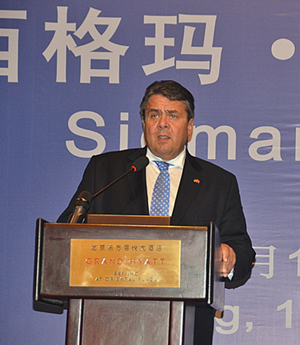German party leader calls for closer relations with China

Sigmar Gabriel delivers a speech in Beijing on July 15
Despite holding divergent views on their development paths, Germany and China must work to “strengthen exchanges and meet each other halfway,” German vice-chancellor Sigmar Gabriel said in Beijing on July 15.
Gabriel, who is also president of the Social Democratic Party (Sozialdemokratische Partei Deutschlands, SPD), is the first leader of his party to embark on a China tour since Willy Brandt's visit in 1984. The SPD was one of the first Western parties to establish formal relations with the Communist Party of China.
Gabriel spoke highly of fruitful results from the friendly exchanges between the two parties over the past 31 years, noting Brandt’s China policy still holds strong significance. “It is vital to regard each other as partners and understand values and attitudes of the other, so that we can foster real mutual understanding and jointly bring changes and developments,” he said.
In his speech, Gabriel recalled remarkable achievements in the Germany-China relationship. “More than 30 years ago, when Deng Xiaoping met with Brandt, they might never have imagined the two countries would become such frequent collaborators,” he said, citing that China became one of the few countries to launch a government consultation mechanism with Germany in 2011.
Gabriel also proposed how to deepen Germany-China ties. In the business sphere, he invited more Chinese to invest in Germany. “Investment is synonymous with the future. Investing in a country means confidence in its future,” he said.
In regards to global governance, Gabriel again called for strengthened cooperation. “Gone is the age when only one country dominates the world. We now live in a multi-polar world,” he said.
Germany and China have found a new path to tackle global and regional problems, Gabriel added. He shed light on the recent comprehensive agreement on the nuclear issue of Iran that was reached through arduous negotiations. “[The agreement] is a positive sign that we are able to create a peaceful world, and peace can only be realized through consultation, cooperation and dialogue,” he said.
Finally, Gabriel appealed for Germany and China to join hands to overcome global challenges, including climate change and terrorism.
Mao Li is a reporter at the Chinese Social Sciences Today.
